
This is a fake picture, but I still thought it was pretty cool.
Please choose one of the following questions to answer for your blog. These questions come from your colleagues, so enjoy.
1. Do you feel that Theodore Roosevelt’s plan of consumer protection is American or anti-American? Teddy passed various laws such as the Pure Food and Drug Act and the Meat Inspection Act. The government took on a new role, becoming more involved in people’s lives. But does more government ‘interference’, as some would call it (others have called it socialism!), represent American values? Would you have done anything differently? – Fred A.
2. Muckrakers played in big role in politics when they began to write in the early 1900s. Today, journalists also find sources of corruption and abuse to publicize – 60 Minutes, Dateline, regular newspapers and magazines + bloggers. Identify sources of muckraking today and compare reactions and effects of the writing with the previous generation of muckrakers.
– Also, TR did not like the muckrakers because he felt that they just talked trash and didn’t make any suggestions or try to help fix things and were just critical and negative. Do you believe that today’s muckrakers are just a negative source like TR did or do they do a good job of exposing corruption and abuses? – Eleanor C.
3. Nike is like Standard Oil in how they monopolize the shoe and clothing industry. But Nike is also like any other type of monopolistic business in the Progressive Era. Nike pays young kids in Asia to do very hard labor for very low wages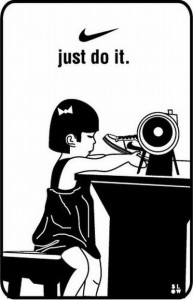 . It is much like how things used to be here. Do you belive it is ethical what Nike is doing to young kids in Asia? Why or why not? – Declan G.
. It is much like how things used to be here. Do you belive it is ethical what Nike is doing to young kids in Asia? Why or why not? – Declan G.
4. Do you think that the reasons America began imperializing overseas in the 1890s (new markets, manifest destiny, naval power, and Anglo-Saxon superiority) are legitimate reasons to expand? Why or why not? If not, why do you think more people weren’t protesting America’s imperialist policies? – Claire F.
5. If you were going to cast a movie about the late 1800s business tycoons like Rockefeller, Carnegie and Morgan, who would you cast and why? – Patrice B.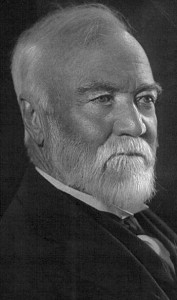
6. Compare our federal government today to the federal government during the progressive era. Do you feel the (federal) government should be more or less involved in social issues such as the Headstart Plan* and environmental regulations**? If more, what else do you suggest the government do? If less, what do you suggest the government not do? – Lucy B.
*A simple summary of the Headstart Plan can be found by clicking the link.
**There have been environmental regulations proposed such as the US federal government forcing every citizen to have only fluorescent lightbulbs in their homes in two years (fluorescent lightbulbs, the ones with mercury in them, conserve energy, but are a health and environmental risk)
7. Teddy Roosevelt had a strong sense of conserving the environment for future generations before he became president and enacted laws during his tenure. Today, when we talk about saving the environment, people mention global warming and debate whether or not it’s a hoax. It seems to me that this debate just distracts from the overall point that we could be doing more, like TR, to help conserve natural resources since as Americans, we consume more energy and stuff, per capita, than other people in the world. What can we do to help make the planet a better place to live in? – Elizabeth B.
8. James Cameron’s Avatar was a tremendous hit last year, but it also had amazing plot similarities to the 1990 Western, Dances With Wolves. Both are sagas about Americans imperializing another land and shoving people off of it, regardless of the consequences to the native (Navi) people. If you’ve seen either movie, can you view either one as a critique of American imperialism? Why or why not? – David B.
9. If you could go back in time and decide whether America would go to war against the Spanish in 1898, would you? Why or why not? Please explain. – Raven G.
10. Imperialism is a form of government that Americans shunned. We have stood and fought against it in World Wars 1 and 2, yet we are imperialists ourselves and are dependent on other countries for our personal comfort and economy. Would you be true to America’s democratic roots and fight imperialism? Or would you be an imperialist that conquers and controls other countries? Why do you believe so? – Braxton A.
11. After the Spanish American War, America liberated the Philippines from Spain, but didn’t grant them independence. If you had to decide back then, would you rather see America as a laid-back nation that watched over the world, or would it be better to become an active world power, helping other nations (which sometimes came under the banner of imperialism)? Why? – Larry G.
12. What do you think the implications of the US foreign policy are now that Egypt’s old president, Hosni Mubarek, is out of office? Remember that Egypt has control of 5% of the flow of oil through the Suez Canal and because we are allies w/ Egypt. – Kaylee B. 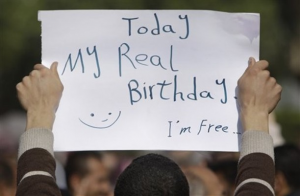
13. What business/society problems are around today that muckrakers would or should attack? How would they attack them- would it be through articles still? What results might these exposes bring? Explain. – Lizzie D.
14. In the last half century, the US has entered many countries under the mission of “spreading democracy”. Do you think this is a form of imperialism and is it fair for us to force our values on other countries? Why or why not? – Cameron
15. In 1960 during the height of the Cold War, the United States placed a partial embargo on newly-communist Cuba. Then, after the Cuban Missile Crisis in the fall of 1962, President Kennedy enacted a travel ban to Cuba for US citizens. The ban, currently the world’s longest-standing embargo, still allows us to export goods to Cuba, but we can’t get bring anything back. Since the Cold War is over and Castro is almost dead, should the US lift the embargo with Cuba? Why or why not? – Evan D.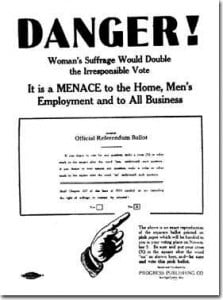
16. The Women’s Suffrage movement took a long time to impact national laws to get women the right to vote. Do you think if this would have taken place in current times that the suffrage amendment would have been easier or harder to pass? Would current events overpower the suffrage movement or would the Women’s Suffrage movement be at the top of the list? Why? – Stephanie D.
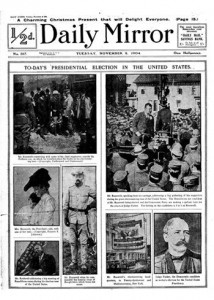
From Britain's The Daily Mirror in 1904
17. How do you think American life would be different if President McKinley hadn’t been shot in 1901? Would Teddy Roosevelt ever have become president? Would we still have national parks? Explain. – Katie D.
18. What are some of the problems of our progressive income tax (where the rich pay a higher tax rate than the middle class or poor)? Do they outweigh the benefits? Why or why not? – Ben C.
19. There were three main candidates during the election of 1912: Woodrow Wilson, Theodore Roosevelt, and William H. Taft. Each president had many views and approaches to the United States problems. Some were different from one another, and some were shared by two or all three. If you lived back in 1912 and were eligible to vote, which candidate would you have chosen and why? – Erick D.
20. Why would U.S. companies outsource jobs back in the early 1900s and now if so many people here need jobs here? – Alex C.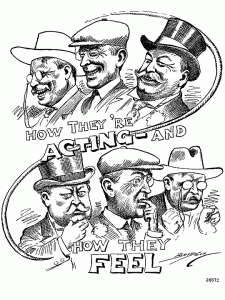
21. If Teddy Roosevelt was magically transported to the present day, what do you think his opinions would be of today’s politics, policies, and the wars in Iraq and Afganistan? Why? – Rachel G.
Blog #12 is due Monday, February 28 before class.
250 words minimum.









